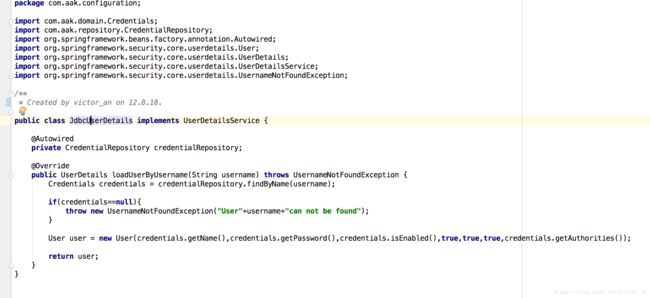springboot+springsecurity+oauth2整合(并用mysql数据库实现持久化客户端数据)
Springboot+Springsecurity+Oauth2整合(并用mysql数据库实现持久化客户端数据)
本文主要讲的是,实现oauth2的工作流程,对客户端数据用mysql数据库实现持久化。需要对oauth2.0概念有一定的基础知识了解。阅读前请学习oauth2.0的理论知识。文末有此项目代码地址。
- 介绍
- 建表
- 权限和用户的建立
- Spring Security配置
- Oauth2 的配置
- Authorization Server - 授权服务器
- Resource Server - 资源服务器
介绍
在github上许多关于用springsecurity搭建oauth2的Demo,但是几乎所有的都是把注册的Client放到内存中的,也就是带有 clients.inMemory() 这种代码的,项目启动时,会把这个Client初始化到内存中。你一定会看到以下代码:
public void configure(ClientDetailsServiceConfigurer clients) throws Exception {
clients.inMemory().withClient("client_1")
.authorizedGrantTypes("client_credentials", "refresh_token")
.scopes("select")
.authorities("oauth2")
.secret("123456");
}
然而这样在生产环境肯定是不行的!因为我们要对客户开放注册Client!我们要实现Client的注册,动态的加载到Oauth服务中。
所以要实现Client的持久化,本文用到的数据库是Mysql,表的建立是依照Oauth2标准来建立的。
文末测试以Oauth2中grant_type=client_credentials为例说明。
建表
建表sql文件在文末项目中,点进去可以看到有 data.sql 和 schema.sql两个sql文件,既一些样例数据,和oauth建表sql。ResourceServer中的两个sql文件为受保护资源的样例数据,和建表sql
要建立起Oauth2客户端,我们需要建立以下几张表:
oauth_client_details
oauth_client_token
oauth_access_token
oauth_refresh_token
oauth_code
我们以 “product_api” 命名resourceServer中的api请求路径,我们定义一个客户端叫做:read-write-client(认证权限类型:read,write)
INSERT INTO OAUTH_CLIENT_DETAILS(CLIENT_ID, RESOURCE_IDS, CLIENT_SECRET, SCOPE, AUTHORIZED_GRANT_TYPES, AUTHORITIES, ACCESS_TOKEN_VALIDITY, REFRESH_TOKEN_VALIDITY)
VALUES ('read-write-client', 'product-api','$2a$10$BurTWIy5NTF9GJJH4magz.9Bd4bBurWYG8tmXxeQh1vs7r/wnCFG2','read,write', 'client_credentials', 'ROLE_PRODUCT_ADMIN', 10800, 2592000);
#password [密码为加密后的“user”] :user
权限和用户的建立
SpringSecurity为我们提供了两个非常有用的接口:
- UserDetails-提供用户核心信息
- GrantedAuthority-授予身份验证对象以权限
我们向表中加入三个用户:
INSERT INTO authority VALUES(1,'ROLE_OAUTH_ADMIN');
INSERT INTO authority VALUES(2,'ROLE_ADMIN_PRODUCT');
INSERT INTO authority VALUES(3,'ROLE_RESOURCE_ADMIN');
INSERT INTO credentials VALUES(1,b'1','oauth_admin','$2a$10$BurTWIy5NTF9GJJH4magz.9Bd4bBurWYG8tmXxeQh1vs7r/wnCFG2','0');
INSERT INTO credentials VALUES(2,b'1','resource_admin','$2a$10$BurTWIy5NTF9GJJH4magz.9Bd4bBurWYG8tmXxeQh1vs7r/wnCFG2','0');
INSERT INTO credentials VALUES(3,b'1','user','$2a$10$BurTWIy5NTF9GJJH4magz.9Bd4bBurWYG8tmXxeQh1vs7r/wnCFG2','0');
INSERT INTO credentials_authorities VALUES (1, 1);
INSERT INTO credentials_authorities VALUES (2, 3);
INSERT INTO credentials_authorities VALUES (3, 2);
#Password : user
Spring Security配置
通过继承WebSecurityConfigurerAdapter并用@EnableWebSecurity注解来实现安全保障。
package com.aak.configuration;
import org.springframework.context.annotation.Bean;
import org.springframework.context.annotation.Configuration;
import org.springframework.security.config.annotation.authentication.builders.AuthenticationManagerBuilder;
import org.springframework.security.config.annotation.web.builders.HttpSecurity;
import org.springframework.security.config.annotation.web.builders.WebSecurity;
import org.springframework.security.config.annotation.web.configuration.EnableWebSecurity;
import org.springframework.security.config.annotation.web.configuration.WebSecurityConfigurerAdapter;
import org.springframework.security.core.userdetails.UserDetailsService;
import org.springframework.security.crypto.bcrypt.BCryptPasswordEncoder;
import org.springframework.security.crypto.password.PasswordEncoder;
import org.springframework.security.web.util.matcher.AntPathRequestMatcher;
@EnableWebSecurity
@Configuration
public class WebSecurityConfiguration extends WebSecurityConfigurerAdapter {
@Bean
public PasswordEncoder passwordEncoder() {
return new BCryptPasswordEncoder();
}
@Bean
@Override
public UserDetailsService userDetailsServiceBean() throws Exception {
return new JdbcUserDetails();
}
@Override
public void configure(WebSecurity web) throws Exception {
web.ignoring().antMatchers("/webjars/**","/resources/**");
}
@Override
protected void configure(HttpSecurity http) throws Exception {
http
.authorizeRequests()
.antMatchers("/login","/logout.do").permitAll()
.antMatchers("/**").authenticated()
.and()
.formLogin()
.loginProcessingUrl("/login.do")
.usernameParameter("username")
.passwordParameter("password")
.loginPage("/login")
.and()
.logout()
.logoutRequestMatcher(new AntPathRequestMatcher("/logout.do"))
.and()
.userDetailsService(userDetailsServiceBean());
}
@Override
protected void configure(AuthenticationManagerBuilder auth) throws Exception {
auth.userDetailsService(userDetailsServiceBean())
.passwordEncoder(passwordEncoder());
}
}
Oauth2 的配置
还需要建立两个组件:
- Authorization Server - 授权服务器
- Resource Server - 资源服务器
Authorization Server - 授权服务器
授权服务器负责验证用户标识并提供令牌,使用@EnableAuthorizationServer注解启用授权服务器配置。
package com.aak.configuration;
import org.springframework.boot.context.properties.ConfigurationProperties;
import org.springframework.boot.jdbc.DataSourceBuilder;
import org.springframework.context.annotation.Bean;
import org.springframework.context.annotation.Configuration;
import org.springframework.security.oauth2.config.annotation.configurers.ClientDetailsServiceConfigurer;
import org.springframework.security.oauth2.config.annotation.web.configuration.AuthorizationServerConfigurerAdapter;
import org.springframework.security.oauth2.config.annotation.web.configuration.EnableAuthorizationServer;
import org.springframework.security.oauth2.config.annotation.web.configurers.AuthorizationServerEndpointsConfigurer;
import org.springframework.security.oauth2.config.annotation.web.configurers.AuthorizationServerSecurityConfigurer;
import org.springframework.security.oauth2.provider.approval.ApprovalStore;
import org.springframework.security.oauth2.provider.approval.JdbcApprovalStore;
import org.springframework.security.oauth2.provider.client.JdbcClientDetailsService;
import org.springframework.security.oauth2.provider.code.AuthorizationCodeServices;
import org.springframework.security.oauth2.provider.code.JdbcAuthorizationCodeServices;
import org.springframework.security.oauth2.provider.token.TokenStore;
import org.springframework.security.oauth2.provider.token.store.JdbcTokenStore;
import javax.sql.DataSource;
@Configuration
@EnableAuthorizationServer
public class AuthorizationServerConfiguration extends AuthorizationServerConfigurerAdapter {
@Bean
@ConfigurationProperties(prefix = "spring.datasource")
public DataSource oauthDataSource() {
return DataSourceBuilder.create().build();
}
@Bean
public JdbcClientDetailsService clientDetailsService() {
return new JdbcClientDetailsService(oauthDataSource());
}
@Bean
public TokenStore tokenStore() {
return new JdbcTokenStore(oauthDataSource());
}
@Bean
public ApprovalStore approvalStore() {
return new JdbcApprovalStore(oauthDataSource());
}
@Bean
public AuthorizationCodeServices authorizationCodeServices() {
return new JdbcAuthorizationCodeServices(oauthDataSource());
}
@Override
public void configure(ClientDetailsServiceConfigurer clients) throws Exception {
clients.withClientDetails(clientDetailsService());
}
@Override
public void configure(AuthorizationServerSecurityConfigurer oauthServer) throws Exception {
oauthServer.allowFormAuthenticationForClients();
oauthServer.checkTokenAccess("permitAll()");
}
@Override
public void configure(AuthorizationServerEndpointsConfigurer endpoints) throws Exception {
endpoints
.approvalStore(approvalStore())
.authorizationCodeServices(authorizationCodeServices())
.tokenStore(tokenStore());
}
}
在 application.yml 中配置一下数据库连接。
授权服务器配置成功后,我们启动项目,就能看到这个登陆界面。
输入用户名:oauth_admin 密码:user 登陆
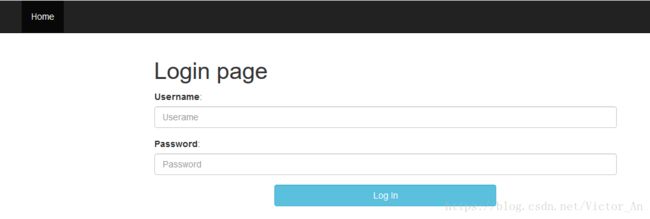
ClientOpt
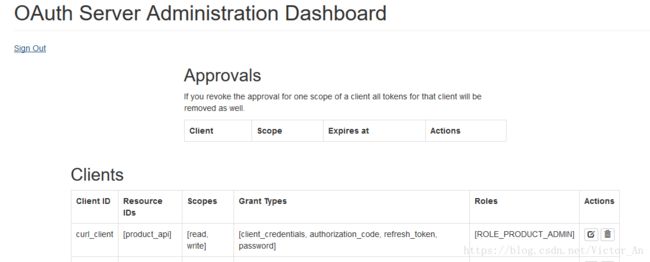
Resource Server - 资源服务器
资源服务器受保护于OAuth2令牌保护的资源(就是我们刚才配置的 product_api)。
package com.aak.configuration;
import org.springframework.boot.context.properties.ConfigurationProperties;
import org.springframework.boot.jdbc.DataSourceBuilder;
import org.springframework.context.annotation.Bean;
import org.springframework.context.annotation.Configuration;
import org.springframework.http.HttpMethod;
import org.springframework.security.config.annotation.web.builders.HttpSecurity;
import org.springframework.security.oauth2.config.annotation.web.configuration.EnableResourceServer;
import org.springframework.security.oauth2.config.annotation.web.configuration.ResourceServerConfigurerAdapter;
import org.springframework.security.oauth2.config.annotation.web.configurers.ResourceServerSecurityConfigurer;
import org.springframework.security.oauth2.provider.token.TokenStore;
import org.springframework.security.oauth2.provider.token.store.JdbcTokenStore;
import javax.sql.DataSource;
@EnableResourceServer
@Configuration
public class ResourcesServerConfiguration extends ResourceServerConfigurerAdapter {
@Bean
@ConfigurationProperties(prefix="spring.datasource")
public DataSource ouathDataSource(){return DataSourceBuilder.create().build();}
@Override
public void configure(ResourceServerSecurityConfigurer resources)throws Exception{
TokenStore tokenStore=new JdbcTokenStore(ouathDataSource());
resources.resourceId("product_api").tokenStore(tokenStore);
}
@Override
public void configure(HttpSecurity http) throws Exception{
http
.authorizeRequests()
.antMatchers(HttpMethod.GET, "/**").access("#oauth2.hasScope('read')")
.antMatchers(HttpMethod.POST, "/**").access("#oauth2.hasScope('write')")
.antMatchers(HttpMethod.PATCH, "/**").access("#oauth2.hasScope('write')")
.antMatchers(HttpMethod.PUT, "/**").access("#oauth2.hasScope('write')")
.antMatchers(HttpMethod.DELETE, "/**").access("#oauth2.hasScope('write')")
.and()
.headers().addHeaderWriter((request, response) -> {
response.addHeader("Access-Control-Allow-Origin", "*");
if (request.getMethod().equals("OPTIONS")) {
response.setHeader("Access-Control-Allow-Methods", request.getHeader("Access-Control-Request-Method"));
response.setHeader("Access-Control-Allow-Headers", request.getHeader("Access-Control-Request-Headers"));
}
});
}
}
接下来我们就可以测试了!!!
第一步:我们启动AuthorizationServer,用账号:oauth_admin 密码:user 登陆。
可以看到 OAuth Server Administration Dashboard 这个界面,可以在这里添加客户端,比如我们这里建立一个grant_type 包括 client_credentials 的客户端。

请求resourceServive时,这里我们用firefox里面的RESTClient测试:
http://localhost:8080/oauth/token?grant_type=client_credentials&client_id=newtest&client_secret=user
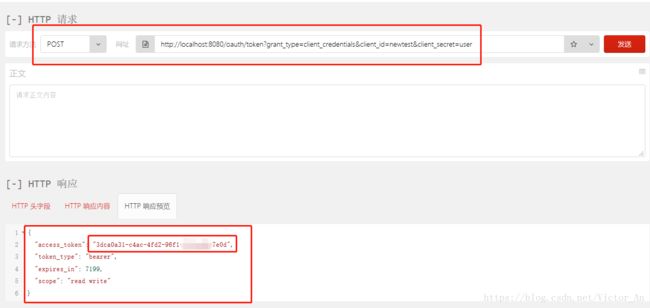
我们从返回的json里面可以直接获取到 access_token!
第二步:我们用另一台机器启动ResourceServer(或者可以换一个端口来启动),拿着我们刚刚获取到的token去请求我们需要的资源。
首先我们不带access_token,直接请求资源路径:
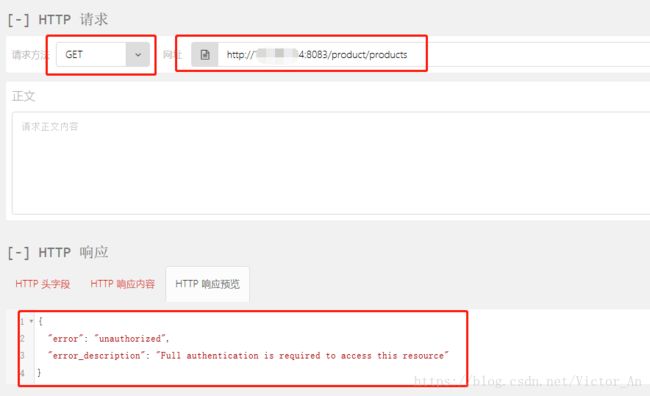
我们会看到是没有权限访问的。
接下来我们带着用刚才获取到的access_token去访问资源。
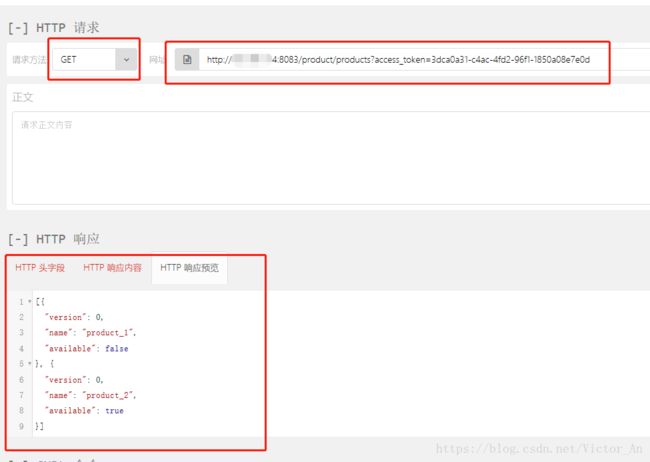
可以看到我们成功的访问到了受保护的资源!!!
代码地址:https://github.com/victorzhgx/oauth2
